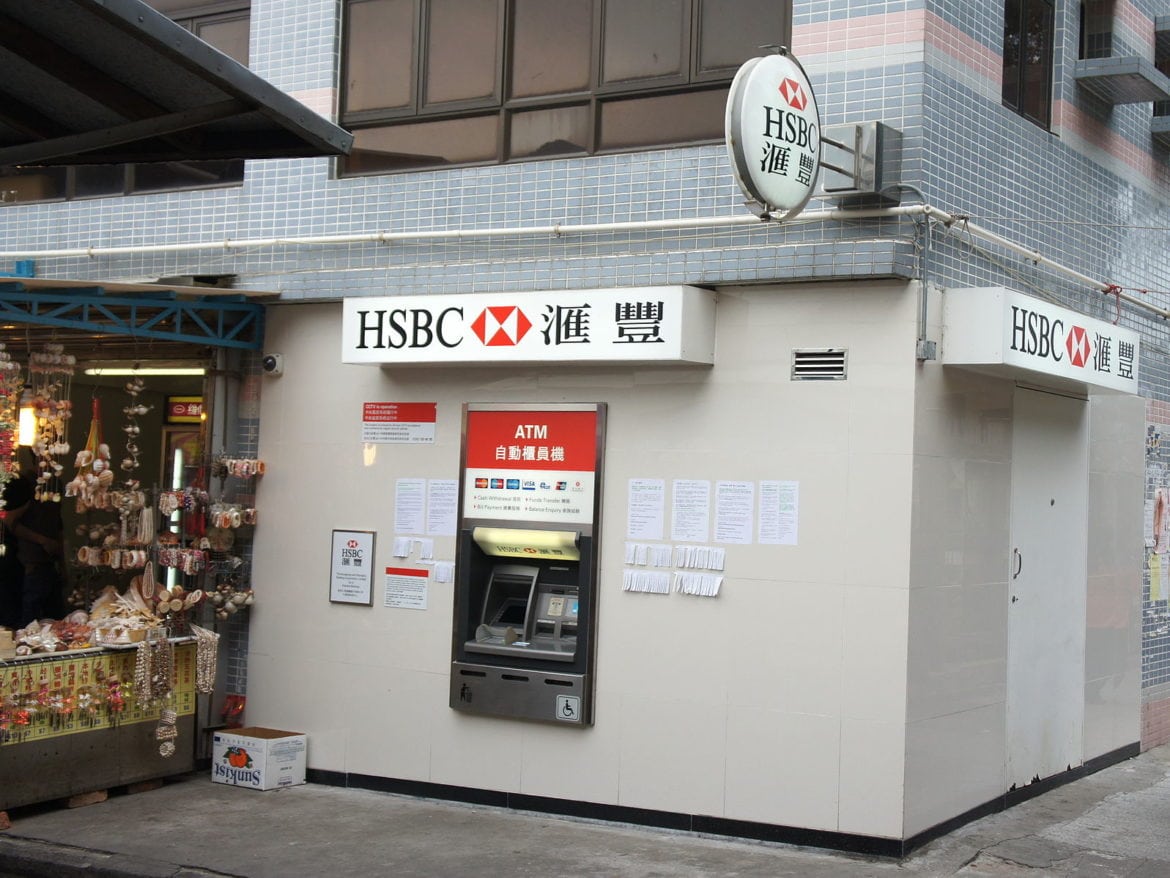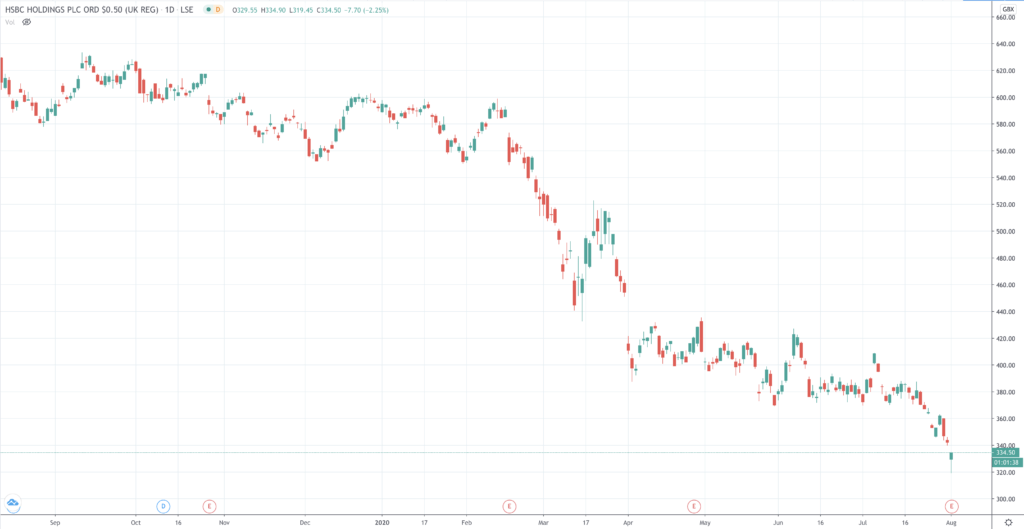
Global banking giant HSBC (HSBA) reported highly disappointing half-year results – even more disappointing than the market’s already scaled-back expectations.
Losses on loans severely dented first-half profits, which fell by more than half, to $5.6 billion.
On a quarterly view its was even worse, with net come collapsing.
Analyst expectations of $1.3 billion net income were dashed; instead there was an almost total evaporation – the bank reported net income of only $192 million.
There was more bad news in the company’s disclosure that it was setting aside $8 billion to $13 billion for expected charges for bad debts.
A second-quarter impairment charge of $3.8 billion hasn’t helped matters either. The bank blamed poor UK economic performance for 40% of that figure.
HSBC has lost 2.2% of its value today in London trading, with the share price at levels last visited in 1996 (334p).

Dividend suspended, US-China tensions nightmare
HSBC shareholders have endured a pitiful year to date.
In April HSBC suspended its dividend after coming under pressure from the Bank of England, much to the anger of its many Asian shareholders.
This is the first suspension of the dividend in 74 years and has reignited chatter about the bank moving its corporate headquarters from the UK to Hong Kong. There are however, substantial risks associated with redomiciling to Hong Kong, given the passing of the national security law.
Global bank HSBC has been caught up in the mounting tensions between the US and China and that’s the very last place the bank wants to be.
Chief executive Noel Quinn didn’t beat about the bush on that: “China and the US inevitably create challenging situations for an organisation with HSBC’s footprint.”
HSBC has been criticised by Washington for being too close to China, while at the same time facing criticism from China for allegedly colluding with US authorities in the extradition case concerning Huawei chief financial officer Meng Wanzhou, who stands accused by the US of directing the Chinese telecoms equipment manufacturer to break sanctions against Iran.
Meng Wanzhou is the daughter of Huawei founder and chief executive Ren Zhengfei.
Meng’s lawyers are fighting her extradition from Canada to the US. In recent court papers her lawyers claim that HSBC misrepresented the facts and, contrary to charges, were made aware of the entirety of Huawei’s business dealings in Iran with Skycom.
Meng’s lawyers state: “HSBC agreed to cooperate with the government’s efforts to depict Huawei as the mastermind of HSBC’s sanctions violations and supply witnesses to the government’s stalled investigation of Huawei.”
Suffice to say, HSBC denies the allegations.
Difficult tightrope to walk for HSBC
None of this will be particularly welcome developments for shareholders of the bank, to put it mildly.
The bank has been doubling-down on efforts to concentrate on the fast-growing Asia region by selling US investments in favour Asian ones.
Asia is where the bank has its roots, as its original name attests: the Hong Kong and Shanghai Banking Corporation. But that provenance may not be the advantage it once seemed just a couple of years ago.
The company admits as much in the commentary accompanying the earnings statement: “Disagreements over trade, technology, human rights and the status of Hong Kong could result in people, sanctions, regulatory, reputational and market risks for the group.”
HSBC has an immensely difficult tightrope to walk. For instance, its well-established position in Hong Kong should have placed it an enviable position given that Hong Kong has traditionally operated as the interface between China and the world’s capital markets.
Introduction of the national security law in Hong Kong was supported by the bank. However, if we read into the stance adopted by defence lawyers in the Huawei extradition wrangle, HSBC is getting no benefit from that accommodative approach.
An article appearing on China’s Global Times news website – an outlet known for its strident nationalism and being closely aligned with the ruling Communist Party – says there may be “legal consequences in China for colluding with US”.
Although the risks at the political level are disconcerting, the banks business in both mainland China and Hong Kong remains on fairly sure footing.
Quinn says revenue in China has grown for the past three quarters and deposits in Hong Kong were actually higher in the most recent quarter.
Few reasons to buy, plenty to sell – but still one to watch
A year ago HSBC dumped former chief executive John Flint, replacing him with Quinn, marking a hoped for change in direction and financial fortunes for the bank.
Quinn early on reportedly set out plans to devolve more decision-making powers to its regional managers and generally seeking to streamline its operations to reduce costs. The bank says it is speeding up these efforts in response to the mounting losses.
With the dividend drought set to continue for the rest of this year – the bank said it will not be reevaluating dividend policy until year’s end – and the Covid pandemic and geopolitical storm clouds showing few signs of abating, there are not many reasons to buy HSBC.
Of 24 analysts surveyed by Refinitiv, half have slapped an underperform rating on the stock, although the median of 12-month price forecasts is $400, a substantial premium on where we are today and difficult to tally with half of the same analysts rating the shares to underperform.
However, assuming it weathers the geopolitical and Covid storms, HSBC is still one of the banks best placed to reap the rewards of the Asia growth story, so it would be remiss of investors in bank shares not to keep this blue-chip on the watchlist for signs of recovery. And for the same reasons watch Standard Chartered.

Question & Answers (0)